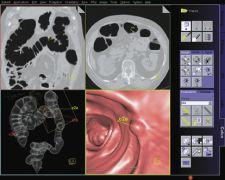
Siemens Medical Solutions announced the release of a new version of syngo Colonography PEV (Polyp Enhanced Viewing), an automated second reader tool for the visualization of lesions in the colon.
The solution helps radiologists to detect polyp-shaped objects between six millimeters and 25 millimeters in size, and can now be used both in clean-prepped and solid-liquid tagged protocols. With the new version, the syngo Colonography PEV delivers the benefits of computer-assisted reading to a wider range of protocols commonly applied in CT colonography today, including stool tagging agents. The PEV tool is said to allow for seamless integration into the syngo Colonography CT application.
Together with workflow-enhancing features such as Auto Polyp Measurements, the software reportedly improves reading accuracy as well as efficiency. The solution was developed using an extensive database of more than 1700 CT colonography cases from more than 15 clinical sites worldwide and covers a variety of CT acquisition parameters and bowel preparation protocols.


 February 06, 2024
February 06, 2024 









